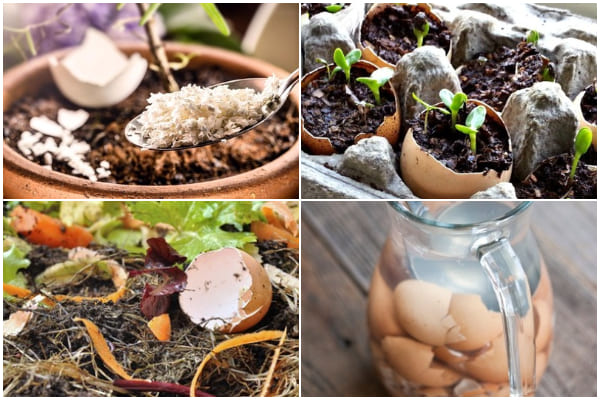Eggshells, commonly regarded as kitchen waste, hold untapped potential as a valuable resource for gardening enthusiasts. Often discarded without a second thought, these seemingly simple shells are packed with essential nutrients, primarily calcium carbonate, along with trace minerals like magnesium and potassium. These nutrients play a crucial role in fostering healthy soil, promoting robust plant growth, and even acting as a natural defense against pests. By embracing the reuse of eggshells in your garden, you not only save money on chemical fertilizers and pest control products but also contribute to an eco-friendly, sustainable gardening practice that reduces household waste.
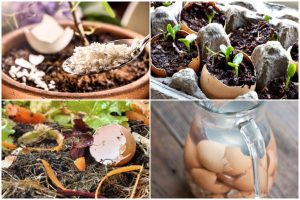
Repurposing eggshells goes beyond mere sustainability—it’s about unlocking a natural powerhouse for your plants. Calcium carbonate strengthens plant cell walls, making crops like tomatoes and peppers less susceptible to disorders like blossom-end rot. Meanwhile, the physical properties of eggshells, when crushed, serve as a deterrent to pests like slugs and snails, offering a chemical-free solution to protect your garden. Furthermore, their gradual decomposition enriches the soil, enhancing its structure and fertility over time.
This guide delves into six ingenious ways to utilize eggshells effectively in your garden. From creating nutrient-rich fertilizers and liquid teas to designing eco-friendly seed starters and compost boosters, these methods are practical and easy to implement. By incorporating these techniques into your gardening routine, you’ll not only nurture healthier plants but also embrace a sustainable approach that benefits the environment. Let’s explore these methods in detail, uncovering how a simple kitchen byproduct can transform your gardening experience.
1. Eggshell Fertilizer
Eggshells consist primarily of calcium carbonate, a compound essential for building strong plant cell walls. Plants like tomatoes, peppers, and zucchini thrive with this added nutrient, as it prevents common problems like blossom-end rot.
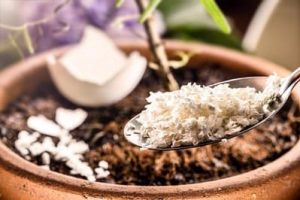
How to Use:
- Prepare the Shells: Collect eggshells, rinse them, and dry them thoroughly.
- Crush or Grind: For best results, crush the shells into small pieces or grind them into a powder using a mortar and pestle or coffee grinder.
- Application: Sprinkle the powder around plant bases or mix it into the soil before planting. This slow-release fertilizer enriches the soil over time, making it a perfect addition to organic gardening.
2. Eggshell Tea
For a faster nutrient delivery system, eggshell tea is an excellent choice. This method extracts calcium and other minerals, making them readily available for absorption.

Steps to Prepare:
- Collect about a dozen clean, crushed eggshells.
- Boil the shells in a gallon of water for 10 minutes.
- Let the mixture steep overnight to extract maximum nutrients.
- Strain the liquid and use it to water your plants weekly.
Eggshell tea is especially beneficial for indoor plants, which may lack access to natural minerals in outdoor soil.
3. Eco-Friendly Seed Starters
Transform eggshells into biodegradable seed-starting pots. This method reduces waste and adds nutrients directly to the soil when transplanted.
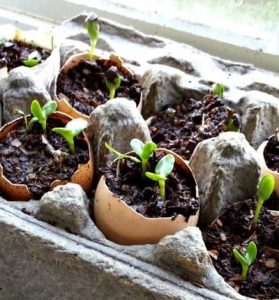
How to Create Seed Starters:
- Prepare the Shells: Crack eggs near the top, keeping the larger half intact. Rinse and dry thoroughly.
- Add Soil and Seeds: Fill the shell with potting soil and plant seeds as usual.
- Plant Directly: Once the seedlings are ready, plant them in the garden, eggshell and all. The shell will decompose over time, enriching the soil with calcium.
This approach not only minimizes waste but also provides an easy way to handle fragile seedlings.
4. Pest Control with Crushed Eggshells
Soft-bodied pests like slugs, snails, and cutworms can wreak havoc on plants. Crushed eggshells act as a natural deterrent by creating an abrasive barrier.
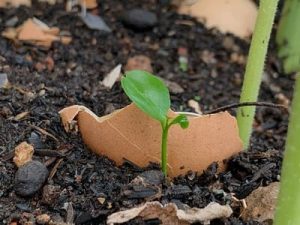
How to Use:
- Scatter coarsely crushed eggshells around vulnerable plants.
- Ensure a thick enough layer to deter pests effectively.
This chemical-free pest control method also introduces calcium into the soil as the shells break down, offering dual benefits.
5. Eggshells in Compost
Adding eggshells to your compost pile can enhance its mineral content, particularly calcium, magnesium, and potassium. These nutrients are essential for healthy plant growth.
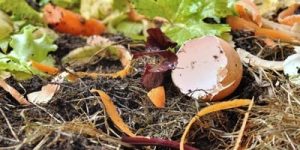
Tips for Composting:
- Crush shells before adding them to speed up decomposition.
- Maintain a balanced mix of green and brown materials in your compost pile.
- Regularly turn the compost to ensure even distribution of nutrients.
Over time, the eggshells will break down and enrich the compost, which can then be used to improve your garden soil.
6. DIY Eggshell and Vinegar Fertilizer
For plants in need of a quick calcium boost, an eggshell and vinegar solution is ideal. The acid in vinegar breaks down the calcium carbonate in eggshells, making it readily available for plants.
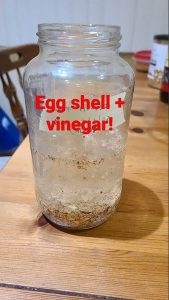
Recipe for Fertilizer:
- Place crushed eggshells in a jar and cover with apple cider vinegar.
- Let the mixture sit for two weeks, stirring occasionally.
- Strain the liquid and dilute with water at a 1:3 ratio before application.
Use this potent fertilizer sparingly on calcium-deficient plants, ensuring their quick recovery and healthy growth.
Additional Tips for Eggshell Use in Gardening
- Mulching: Spread crushed eggshells around plants to improve soil aeration and prevent weed growth.
- Drainage Helper: Add crushed shells to the bottom of pots to improve drainage for container plants.
- Decorative Touch: Larger pieces of eggshells can be dyed and used as eco-friendly garden decor while gradually releasing nutrients.
Eggshells are more than just kitchen scraps—they’re a versatile, eco-friendly solution for enhancing your garden. By using them as fertilizers, pest deterrents, or seed starters, you ensure healthier plants while embracing sustainable gardening practices. Start saving your eggshells today and unlock their full potential in your garden.
Pro Tip: Store crushed eggshells in a jar for easy access whenever needed, and involve your family in this rewarding, sustainable practice. Your plants—and the planet—will thank you!

